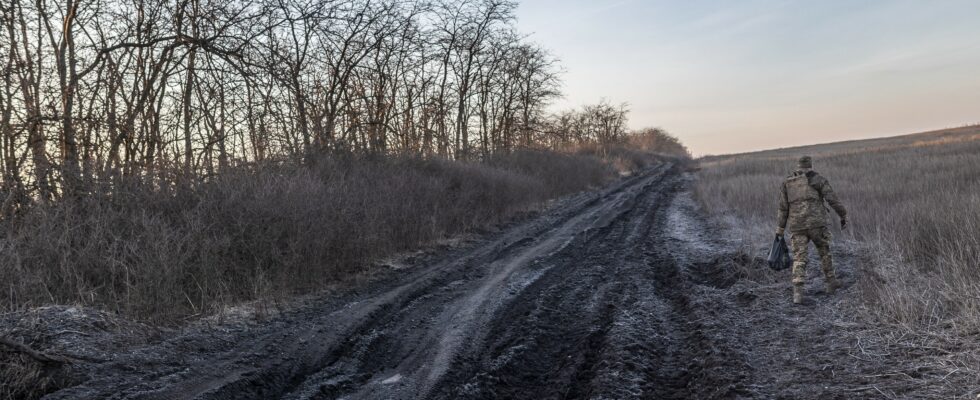Romain Rouillard / Photo credit: DIEGO HERRERA CARCEDO / ANADOLU / ANADOLU VIA AFP
modified to
9:25 p.m., February 27, 2024
Leave the comfort of home to plunge into a war zone with temperatures down to -30 degrees. Today, Adam*, a French soldier returning from Ukraine, does not regret his choice. Aged 30, he fought for 19 months alongside soldiers from kyiv, opposed to Russian troops who had come to invade their neighbor. “I did not hesitate for a single moment. The main reason that pushed me to leave was the defense of values and democracy,” he said in a powerful testimony delivered to Europe. 1.
Considering the harshness of the battles, Adam still takes the time to think carefully. “Many people think that we leave like that, on a whim. But it’s a very in-depth reflection, there are a lot of dangers and risks in going on an adventure like that,” he concedes. he. Captivated by his desire to fight for the values he defends, this former soldier makes his decision: he will join an elite Ukrainian unit. On the front, Adam brings welcome expertise to his brothers in arms.
“You have to know how to do everything yourself”
“We bring a lot of things, because we master the NATO weapons that Ukraine receives. kyiv receives very little material from the former Soviet Union. We are already trained on NATO weapons and we can therefore use quickly”, explains Adam, at the microphone of Hélène Zelany. The ex-soldier also evokes the resourcefulness and skill of French soldiers. Two essential qualities on a war terrain as demanding as Ukraine.
Adam thus cites the example of a vehicle which would find itself broken down in the middle of the field. “It’s not like in the French army where you call the support who comes to pick you up. There, it’s really resourcefulness. You will have a piece of tape and the serflex and you will repair turbines that are broken “. Mechanical skills are also essential. “If, at some point, we come across mines and we have four tires on two pickup trucks that fall, we don’t have a truck with tires on the back. So you have to know how to repair a tire or, at least, make it hold to go a few miles and get out of there.”
And in the event that a soldier is injured, “no one will come and get you,” assures Adam. “You have to be able to exfiltrate the wounded yourself.” Generally speaking, “you have to know how to do everything yourself”. All this under sometimes freezing temperatures which accentuate the intensity of the war. “When we were in Bakhmout, we could get down to -20, -30 degrees. And there, you have no heating, no blanket. It’s an extremely intense war, you don’t have this luxury of power carry gear with you,” Adam describes. And to image a little more the harshness of everyday life. “During the day it’s going to be 0 degrees, so you’ll be hot, but at night it’s going to be -30 degrees and everything you have on you will be full of sweat. So you’ll be cold, but you won’t you’ll have nothing to cover yourself with.
“Like in 14-18”
This war in Ukraine also has the particularity of mixing rusticity and modernity. On the front, soldiers have no choice but to adapt. “Today, we need modern equipment, in particular drones which provide truly increased visibility. But we realize that in the end, to protect yourself from everything you find on a battlefield , the only way we found was to dig a fighting hole and bury ourselves in it. Like in 14-18″, testifies Adam.
Ukrainian soldiers also have to deal with the swarm of enemy drones parading overhead. In these cases, “honestly, there’s not much you can do,” admits Adam. While anti-drone rifles will always be able to ward off the threat of one or two drones, they will under no circumstances be able to decimate the entire swarm. “These are civilian drones that cost almost nothing. So, we are going to destroy X number of drones and there will always be more that come back.”
A difficult equation to solve for these Ukrainian soldiers whom Adam left a few months ago. “I returned to my civilian life. I accomplished all the objectives that I had set for myself,” assures the thirty-year-old who also wanted to preserve his future. “When we leave to help Ukraine, we do not have combatant status. We do not contribute for retirement, we do not contribute for anything. Theoretically, on papers, it is years that we lose . We cannot leave indefinitely,” he concludes.
